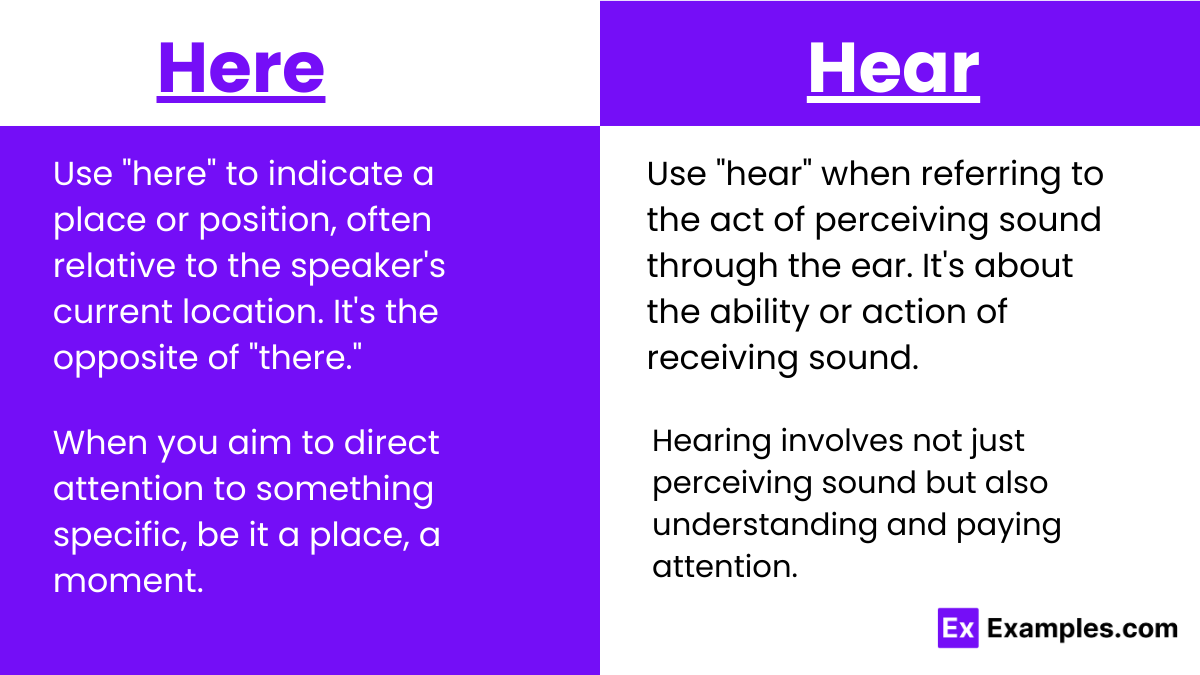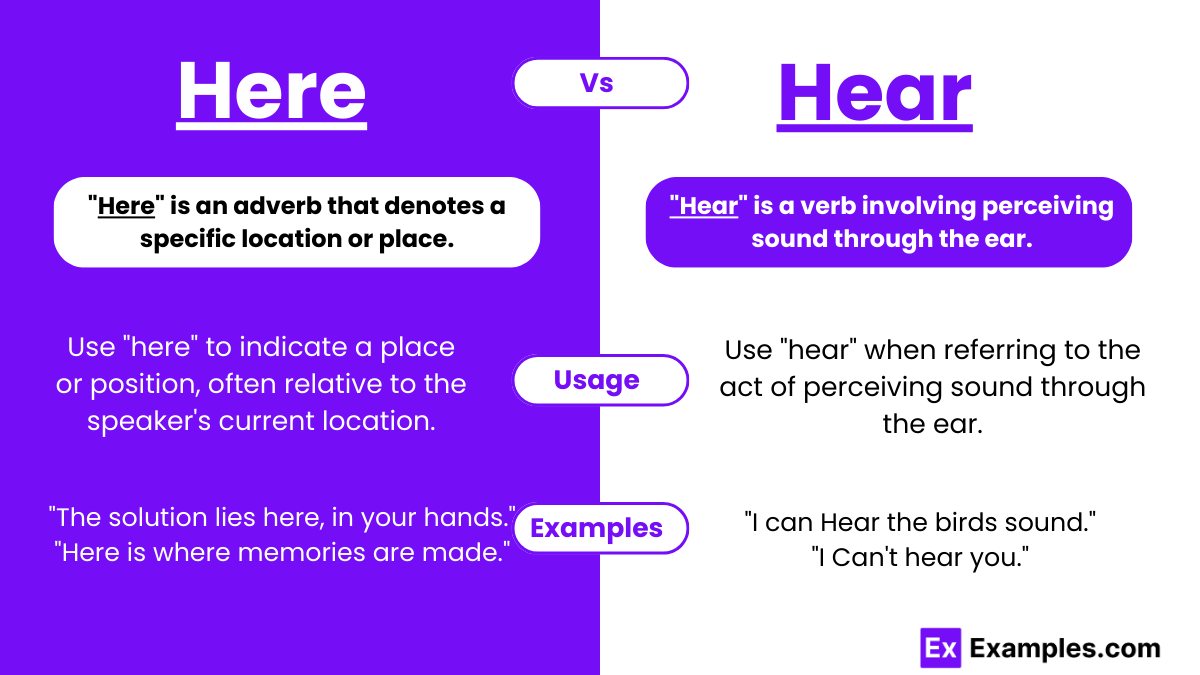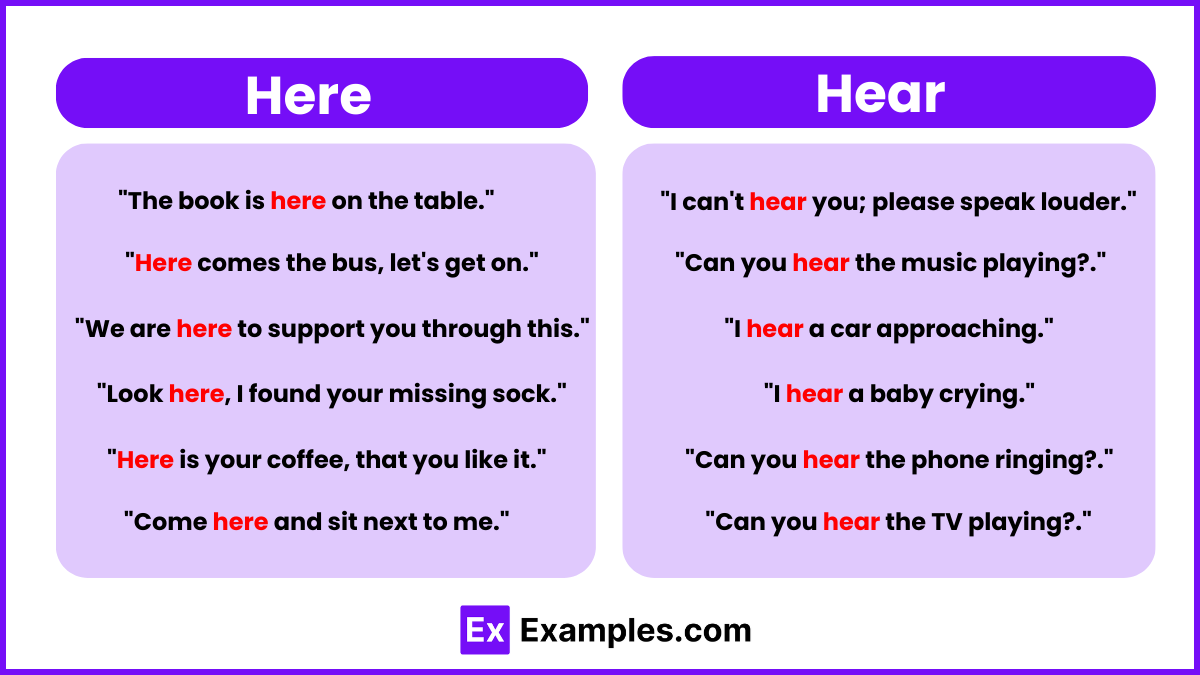Here vs Hear – Examples, Differences, Usage, Tips
The English language can often feel like a journey through a maze, especially when it comes to homophones—words that share the same pronunciation but differ in meaning and spelling. Among these linguistic twins, “here” and “hear” stand out for their frequent appearance in both spoken and written English, often leading to mix-ups that can puzzle learners and seasoned speakers alike. This article is your compass to mastering the nuances of these two words, illuminating their distinct usages and ensuring they no longer pose a challenge in your linguistic adventures.
Understanding the distinction between “here” and “hear” is pivotal for students striving for clarity and precision in communication. “Here” refers to a location or a point in a discussion, whereas “hear” is all about the act of listening or receiving sound. Though they may sound identical when spoken, their roles in sentences are worlds apart. Armed with the insights from this guide, you’ll be equipped to navigate these homophones with confidence, enhancing both your comprehension and expression in the rich tapestry of the English language.
Here and Hear – Meanings
Here: Here is an adverb that denotes a specific location or place. It’s used to indicate the presence of something or someone in the immediate vicinity of the speaker or within the context of a conversation. When you use “here,” you’re referring to a point in space that is close to you. For example, saying “I am here” signifies that you are present in a particular spot. Additionally, “here” can be employed to introduce statements or objects, as in “Here are the documents you requested.”
Hear: Hear, on the other hand, is a verb that involves the act of perceiving sound through the ear. It’s the process of listening to noises, voices, music, or any other auditory input. When you say “I can hear you,” you’re indicating that you can perceive the sounds someone is making. “Hear” extends beyond mere physical hearing; it can also imply paying attention or taking notice, as in “I hear what you’re saying,” which means you understand or acknowledge someone’s point.
In essence, “here” and “hear” serve distinct functions within the English language, with “here” anchoring statements to a location and “hear” connecting us to the world of sound and comprehension. Recognizing and applying these differences is key to clear and effective communication.
Summary
“Here” serves to pinpoint the whereabouts of individuals, objects, or locations, functioning primarily as an adverb to elaborate on actions, or occasionally as an adjective to provide details about nouns or pronouns. Conversely, “hear” encapsulates the act of engaging with or detecting sounds, firmly positioned in the linguistic category of verbs, which articulate various actions. Both terms, though simple in appearance, play crucial roles in the fabric of language, offering clarity and precision in our daily exchanges.
Difference Between Here and Hear
The English language is peppered with words that sound alike yet carry different meanings, leading to common mix-ups and confusion. Among these, “here” and “hear” are particularly notable for their similar pronunciations but distinct uses and meanings. Understanding the difference between these two words is essential for clear and effective communication. Below is a detailed comparison presented in a tabular format to elucidate the distinctions between “here” and “hear,” encompassing their meanings, grammatical roles, and contextual applications.
| Aspect | Here | Hear |
|---|---|---|
| Part of Speech | Can function as an adverb or an adjective. | Primarily a verb. |
| Meaning | Refers to a specific location or place; indicates presence. | Involves the act of perceiving sound; to listen or be informed about something. |
| Usage | Used to describe a location or a point in space relative to the speaker. | Used to indicate the act of listening or the ability to perceive sounds. |
| Context | Often used in instructions, directions, and to introduce objects or ideas. | Commonly used in contexts involving communication, auditory experiences, and information gathering. |
| Examples | “I’ll meet you here at 5 PM.” “Here is the book you asked for.” | “Did you hear that noise?” “I hear you loud and clear.” |
| Synonyms | Hereabouts, herein, hither. | Listen, overhear, eavesdrop. |
| Antonyms | There, elsewhere, away. | Ignore, overlook, miss. |
| Common Phrases | “From here on out,” “Here and now,” “Here you go.” | “Hear me out,” “Hear, hear!” “I can’t hear you.” |
| Grammatical Role | Can modify a verb, adjective, or other adverb in a sentence; sometimes used to modify a noun (as an adjective). | Acts as the main verb in a clause or sentence. |
| Misuse | Incorrectly used in place of “hear” when referring to auditory experiences. | Incorrectly used in place of “here” when indicating location or presence. |
This table aims to shed light on the nuances of “here” and “hear,” guiding users towards a deeper understanding and more precise application of these commonly confused terms in their daily language use.
Examples of Here and Hear
These examples should help clarify the usage of “here” and “hear” in various contexts.
Examples of “Here”
- “Leave the books here on the table.”
- “I have lived here for three years.”
- “The party will be held here at my house.”
- “Please, come here and help me with this.”
- “Here is where we saw the shooting star.”
Examples of “Hear”
- “Did you hear that noise outside?”
- “I can hear the rain tapping on the window.”
- “They didn’t hear me enter the room.”
- “Can you hear the difference between these two notes?”
- “I hope to hear good news from them soon.”
Understanding when to use “here” and “hear” is essential, as these words sound alike (homophones) but have different meanings and uses.
When to Use Here and Hear

Usage of “Here”
- Referring to a location: Use “here” to indicate a place or position, often relative to the speaker’s current location. It’s the opposite of “there.”
- Example: “Please come here.”
- Attracting attention to a specific point or matter: When you want to focus someone’s attention on something specific, whether it’s a location, a moment in time, or a particular aspect of a discussion.
- Example: “Here is where we disagree.”
- Presenting something: “Here” is used when presenting or offering something to someone.
- Example: “Here’s your coffee.”
- Indicating the present time or moment: To refer to the current situation or moment.
- Example: “Here is where we stand on the issue.”
Usage of “Hear”
- Perceiving sounds: Use “hear” when referring to the act of perceiving sound through the ear. It’s about the ability or action of receiving sound.
- Example: “Did you hear that sound?”
- Receiving information or news: When someone receives information, news, or a message, whether directly from a person or through another medium.
- Example: “I heard you’re moving to New York.”
- Listening attentively: In contexts where it’s not just about the physical act of perceiving sound but also about paying attention to or understanding what is being said.
- Example: “Hear me out before you make a decision.”
- Legal or formal request for attention: Particularly in legal contexts or formal meetings, “hear” can be used to request attention to someone’s words or testimony.
- Example: “The court will now hear the witness’s statement.”
Tips of Here and Hear
Certainly! Here are tips for using “here” and “hear” effectively:
- Contextual Cue: “Here” is for spatial references, while “hear” relates to auditory experiences.
- Purpose: Use “here” for indicating location or moment, and “hear” for perceiving sounds or information.
- Attention: “Here” can draw focus to a point or place; “hear” is about listening or receiving news.
- Presentation vs. Perception: “Here” is often about presenting something, whereas “hear” emphasizes perception or reception.
- Instruction vs. Understanding: “Here” is useful for directions; “hear” leans towards the need for comprehension or acknowledgment.
FAQs
Is This “Here” Proper Grammar?
Yes, using “here” is proper grammar when referring to a location or place near the speaker. It’s essential for indicating presence or specifying a location in sentences.
How Do You Remember “Here” and “Hear”?
To remember the difference, link “here” with “where” for location, and “hear” with “ear” for listening. This association helps distinguish their usage based on context.
Would You Say “Here Is” or “Here Are”?
Use “here is” for singular nouns and “here are” for plural nouns. The choice depends on the number of subjects being referred to in the sentence.
Why Is “Here” Spelled That Way?
“Here” is spelled this way due to its Old English origins, deriving from “her” meaning “in this place,” reflecting its use for specifying locations.
Can We Start a Sentence With “Here”?
Yes, starting a sentence with “here” is grammatically correct. It’s often used to draw attention to a specific point, location, or to present something.




